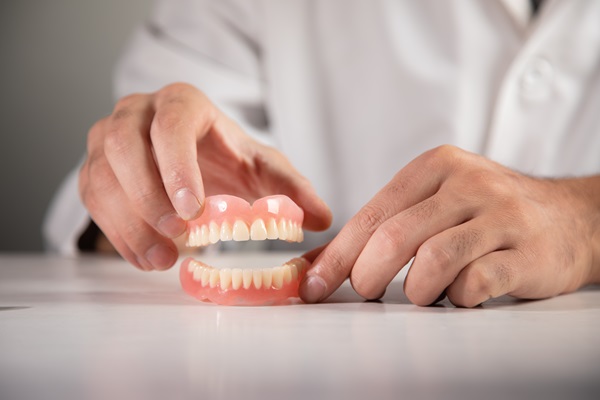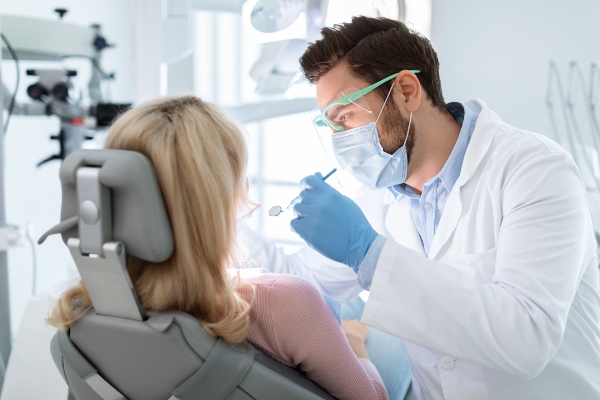Are Dentures Only For Older Patients?

Sometimes it is necessary for young people to get dentures to replace most or all of their teeth. While many people regard denture-wearing as something that occurs as people get older, tooth loss can happen at any age.
If you are missing your natural teeth, dentures can give you back your smile. They do more than help restore your natural appearance, though. They support facial muscles that otherwise sag without teeth in place, making you look older. Dentures also make it easier to speak and, of course, to eat.
How do young people lose their teeth?
If you are young and need dentures, you are not alone. Among the most common causes of tooth loss are poor oral hygiene habits and lack of professional dental care in childhood. These factors can lead to gum disease and tooth decay. However, there are other reasons young people lose teeth:
- Injuries to the mouth or teeth, such as a sports injury or car accident
- Gastrointestinal reflux: a condition that causes stomach acid to enter the mouth and erode teeth
- Hypodontia: a condition in which teeth do not develop
- Ectodermal dysplasia: a genetic disorder that can cause teeth to form abnormally
- Papillion-Lefèvre syndrome: a rare condition that causes degeneration of the structures that support the teeth
- Hypophosphatasia: a genetic disorder that causes impaired mineralization in bones and teeth
No matter what the underlying cause, unexpected tooth loss should be treated as soon as possible to prevent complications, especially in younger children. Traditional dentures had their disadvantages in the past, but modern advances in dentistry have led to significant improvements. For example, many people have found that dentures have a tendency to slip around or fall out of the mouth, especially when eating. In young adults, implant-supported dentures that snap into place are attached to small metal rods, eliminating the concern of a loose fit.
Even without the use of this type of appliance, dentists are able to use modern technology to design dentures that have much better size, shape, and fit for each unique mouth. Proper home care and routine adjustments help ensure that the patient is comfortable and that the appliances are secure for daily use.
What are the benefits of dentures at a young age?
If necessary, children can start wearing dentures in preschool. It may seem early, but children with premature tooth loss can benefit from them. Some of the ways dentures help young people include the following.
Improved speech
At a critical time when children are developing language skills, dentures can help them communicate more effectively. Even synthetic teeth can provide the structures needed to properly form sounds and words, resulting in better speech for improved communication skills.
Better nutrition
Young people need a healthy diet. Digestion begins in the mouth with chewing, and dentures can make it possible to eat raw fruits, vegetables, nuts, and other healthy foods required for growth. They also make chewing more efficient, which can lead to better nutrient absorption and improved digestion.
Improved jaw and tissue development
Dentures can help support the mouth structure as children grow. Implant-supported dentures can also prevent jaw bone loss long-term.
Psychological well-being
Children and teens naturally want to fit in and look like their peers. Dentures can give them a smile to be proud of, increasing their self-confidence. Studies have shown that there are numerous benefits to smiling more often, from lower stress levels and healthy blood pressure levels to an improved mood and a boosted immune system. Dentures can help patients of all ages smile more often, enjoying all the physical and mental health benefits that come with it.
Age-appropriate appearance
Tooth loss causes jaws to overclose and cheeks to sink in, making a young person look older. Dentures support facial structure and help create a regular appearance for the age of the wearer.
Conclusion
If you feel like you are too young for dentures, keep in mind that many other children, teenagers, and young adults wear them, too. You can have dentures that look like your natural teeth, giving you a beautiful smile. They can also enhance growth and speech development by helping you eat healthy foods, support your jaw structure, and use proper speech patterns. There is a learning curve when you get dentures, and it may take some time to get used to them. However, you will look and feel great about your oral health — and, of course, your smile.
Request an appointment here: https://www.martinimplants.com or call Martin Dentistry at (209) 299-7907 for an appointment in our Stockton office.
Check out what others are saying about our dental services on Yelp: Dentures and Partial Dentures in Stockton, CA.
Related Posts
False teeth, or dentures, are removable appliances that help many people eat and smile with confidence. When properly cared for, a set can last for many years.Dentures are typically made of either porcelain or acrylic resin. Porcelain dentures last longer. However, they weigh more than acrylic dentures and are more expensive.Acrylic resin dentures are simpler…
Are you considering getting dentures? Read on to learn more about denture maintenance. Owning dentures comes with a fair share of responsibility, such as their care and maintenance. The following are some essential tips to help your appliance last as long as possible.Dentures may return a lot of normalcy to your life, but they can…
Most healthy dental patients are recommended to visit the dentist for routine dental care, which can include undergoing a cleaning twice a year and obtaining periodic X-rays to ensure the absence of cavities, gum disease, and other common dental abnormalities. Speaking with a dentist and keeping track of hygiene routines at home are great ways…
Daily oral hygiene habits should not be considered a substitute for the routine dental care that occurs during a dental checkup and cleaning. There are oral health concerns that a dentist will be able to proactively address during an office visit, but the equipment and tools used to care for both teeth and gums are…


